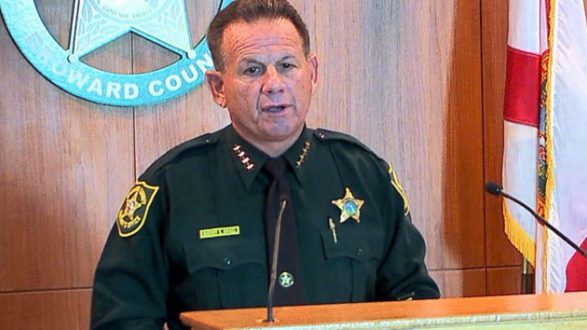
 ABC News(PARKLAND, Fla.) — John Cohen and his police officer partner responded to a call for help to thwart a rape in progress, and after pulling the suspect off of the victim and physically getting control of the suspect, Cohen realized he should have had help.
ABC News(PARKLAND, Fla.) — John Cohen and his police officer partner responded to a call for help to thwart a rape in progress, and after pulling the suspect off of the victim and physically getting control of the suspect, Cohen realized he should have had help.
Cohen said that incident, which happened back when he was a police officer in Southern California in the 1980s, was the first of two times that he felt his partner froze on him.
“I was conscious of the fact that my partner was not with me,” said Cohen, a former police officer who is now an ABC News contributor
After the second incident, Cohen told his sergeant that “as much as I liked the person,” he couldn’t work with the partner anymore.
“As a police officer inevitably you will be forced to confront a situation which requires you to make a split second decision that very well may put your life in jeopardy but may allow you to capture a dangerous suspect or save someone else. I have seen many officers who are able to do that but I have also seen some officers who weren’t,” Cohen said.
Law enforcement officers freezing under pressure has come into the spotlight after reports that the school resource officer at Marjory Stoneman Douglas High School in Parkland, Florida, did not go into the building when the deadly shooting was unfolding.
The exact hesitations or reasoning that prompted Deputy Scott Peterson, who worked as the school resource officer (SRO) at the high school, remain unknown. Peterson was suspended without pay from the Broward County Sheriff’s Office after it was made clear that he remained outside of the building where the shooting was happening for more than four minutes. Peterson met the requirements for retirement and has since resigned.
“He should have went in, addressed the killer, killed the killer,” Sheriff Scott Israel said Thursday in a news conference announcing Peterson’s suspension and retirement.
President Donald Trump has weighed in on the situation, commenting multiple times on Friday about Peterson’s inaction, saying that “turned out to be not good,” adding that he was either a “coward” or someone who froze under pressure.
Peterson received praise from Jeff Bell, the head of the Broward Sheriff’s Office Deputies Association, for “calling the exact location and getting units out there,” he told ABC News. But Bell added that as first responders they’re trained to go into active shooting situations so if they don’t, it should be viewed as a failure.
Cohen said that he “could make the case either way” for the officer entering the building or to wait for back up, noting that “at the end of the day it’s going to be up to that officer in that situation to make the decision.”
Steve Gomez, a former police officer and FBI special agent in charge who is now an ABC News contributor, said that Peterson’s background could play a role in his decision-making process under pressure.
Peterson worked at the sheriff’s department since 1985 and is believed to have served as an SRO for several years.
Gomez explained that Peterson’s lengthy experience at the school would have benefits and drawbacks.
“There’s definitely a benefit of him being assigned to the school for a number of years because he has historical knowledge of how the school functions, he knows the kids and the faculty which means that he is able to develop relationships that will allow him to gather info that would be helpful to secure the school,” Gomez told ABC News.
However, he pointed to beat street cops who “respond to domestic violence calls, crime suppression, or just even pulling over a vehicle with the risk of that vehicle having a criminal and a gun” as examples of those who have experience not freezing.
“Those officers are experiencing high stress, highly dangerous situations on a daily basis so they have no time to freeze,” Gomez said. “My thought is that if he had been away from fighting crime the way most patrol officers deal with crime on a daily basis then he may have been less ready to deal with an active shooter situation at the school.”
Gomez added that conversations about freezing under pressure are ones that “you tend to have with someone at the beginning of their career.” He recalled a fellow police officer, who just months into the job, quit the force shortly after his vehicle was shot while patrolling in a heavy crime area.
“He resigned due to the fear of him getting killed and what that would do to his family that he would leave behind,” Gomez said.
Similarly, Cohen said that he personally had to face down an “overwhelming, paralyzing fear” at times during his years in law enforcement.
“I remember times when I would be driving into work, thinking about my family, thinking about things I may confront at work,” Cohen said. “You pull over to the side of the road and think, ‘What am I doing? Why am I doing this?’”
Both Cohen and Gomez agreed that any internal hesitations need to be assessed and addressed before a life-or-death situation unfolds while the officer is on duty.
“This kind of situation may not have been expected by somebody with 30-plus years on the job,” Gomez said.
Copyright © 2018, ABC Radio. All rights reserved.










